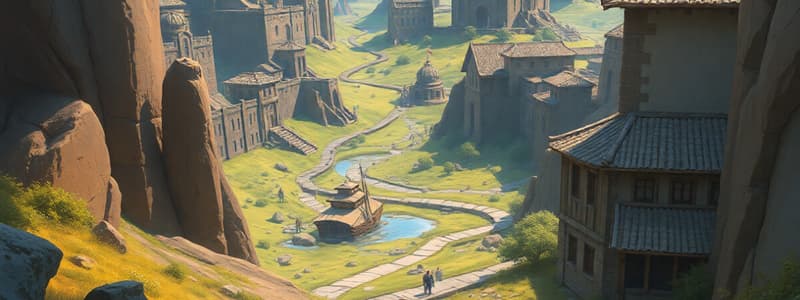Podcast
Questions and Answers
What is involved in cultural exchange?
What is involved in cultural exchange?
- Interaction solely through artistic expression
- The transfer of ideas, beliefs, and practices through migration, trade, and conflict (correct)
- The preservation of cultural heritage without outside influence
- Only the migration of people between cultures
What does source analysis primarily evaluate?
What does source analysis primarily evaluate?
- The date of creation of the sources
- The length and complexity of the texts
- The reliability, authenticity, and bias of the sources (correct)
- The visual appeal of the sources
Which of the following best describes close reading?
Which of the following best describes close reading?
- Comparing different cultures in a general manner
- Analyzing text and visual materials for deeper understanding of details and contexts (correct)
- A method of summarizing historical events in brief
- A technique focusing on the author's intent in a narrative
What does the process of comparison aim to achieve in historical studies?
What does the process of comparison aim to achieve in historical studies?
What is the purpose of contextualization in history?
What is the purpose of contextualization in history?
What is meant by 'periodization' in historical study?
What is meant by 'periodization' in historical study?
Which key concept helps historians understand how societies change while also recognizing enduring elements?
Which key concept helps historians understand how societies change while also recognizing enduring elements?
What role does 'historiography' play in the study of history?
What role does 'historiography' play in the study of history?
Which approach does not fit under the methodologies historians use to interpret the past?
Which approach does not fit under the methodologies historians use to interpret the past?
What does the concept of 'causality' involve in historical investigation?
What does the concept of 'causality' involve in historical investigation?
Which major historical theme examines the factors contributing to the success and decline of empires?
Which major historical theme examines the factors contributing to the success and decline of empires?
Which of the following is NOT a key aspect that historians consider when analyzing historical events?
Which of the following is NOT a key aspect that historians consider when analyzing historical events?
How does 'context' contribute to the analysis of historical events?
How does 'context' contribute to the analysis of historical events?
Flashcards
Causality
Causality
The factors that led to a historical event. Historians identify multiple causes and how they interact.
Context
Context
Examining events within their specific time and place, considering social, economic, political, and cultural factors.
Change and Continuity
Change and Continuity
Understanding how societies and cultures change over time while recognizing the enduring patterns that remain.
Periodization
Periodization
Signup and view all the flashcards
Bias and Interpretation
Bias and Interpretation
Signup and view all the flashcards
Historiography
Historiography
Signup and view all the flashcards
Social Movements
Social Movements
Signup and view all the flashcards
Economic Development
Economic Development
Signup and view all the flashcards
Cultural Exchange
Cultural Exchange
Signup and view all the flashcards
Source Analysis
Source Analysis
Signup and view all the flashcards
Close Reading
Close Reading
Signup and view all the flashcards
Comparison
Comparison
Signup and view all the flashcards
Contextualization
Contextualization
Signup and view all the flashcards
Study Notes
Historical Periods and Concepts
- History studies past events, societies, and cultures, examining human actions and their impact.
- Historical investigation analyzes primary and secondary sources (documents, artifacts, oral traditions).
- Historians use methodologies like social, economic, political, and cultural history to understand the past.
Key Historical Concepts
- Causality: Understanding factors leading to events, often multiple and complex.
- Context: Analyzing events within their specific time and place (social, economic, political, cultural circumstances).
- Change and Continuity: Recognizing societal, cultural, and idea evolution alongside enduring patterns.
- Periodization: Dividing history into distinct periods based on significant events or characteristics (often debated and adjusted).
- Bias and Interpretation: Historical accounts are influenced by historians' viewpoints and values.
- Historiography: Study of how history is written and interpreted (evolving with new sources and approaches).
Major Historical Themes
- Rise and Fall of Empires: Examining factors (political, economic, social) influencing empire success and decline.
- War and Peace: Analyzing military conflicts, treaties, and war's impact on societies and economies.
- Social Movements: Investigating revolutions, reformations, civil rights, and women's suffrage, and their impact.
- Economic Development: Exploring trade, industrialization, and globalization influencing history.
- Technological Advancements: Assessing technological innovation's impact on societies and cultures (communication, transportation, agriculture).
- Cultural Exchange: Evaluating interactions between cultures, including migration, trade, and conflict, leading to idea and belief transfer.
Historical Methodologies
- Source Analysis: Evaluating primary and secondary sources for reliability, authenticity, and bias.
- Close Reading: Analyzing text and visual materials for specific details, patterns, and context.
- Comparison: Examining similarities and differences between historical events to identify patterns and contrasting developments.
- Contextualization: Placing historical events in their broader social, economic, political, and cultural environment.
Studying That Suits You
Use AI to generate personalized quizzes and flashcards to suit your learning preferences.




